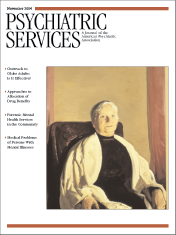Rehab Rounds: Drug and Psychosocial Curricula for Psychiatry Residents for Treatment of Schizophrenia: Part I
Abstract
Introduction by the column editors: In the past decade, we have witnessed a profusion of information aimed at improving the quality of care of persons with schizophrenia. Practice guidelines, algorithms, treatment manuals, and compendia of evidence-based treatments and competencies for practitioners have been published by such organizations as the Agency for Health Care Policy and Research, the National Institute of Mental Health, the American Psychiatric Association, the Texas Algorithm Project, the International Association of Psychosocial Rehabilitation Services, the American Academy of Child and Adolescent Psychiatry, and panels of experts. These recommendations for treatment have encompassed psychopharmacology and psychosocial services.Unfortunately, evidence to date indicates that most clinicians are not following these guidelines. For example, even after a major effort at staff training and "academic detailing," few recommendations from the Schizophrenia Patient Outcomes Research Team (PORT) on treatment of schizophrenia were found to be actually in use by public mental health agencies (1). The Practice Research Network of the American Psychiatric Association has also found that only a few of the psychiatrists who are enrolled in the network use the recommended guidelines for drug treatment and case management for persons with schizophrenia (2). Given the medical imperative "Do no harm," it is alarming that recent evidence has revealed that a disproportionate number of medication errors and adverse drug events occur on psychiatric inpatient units (3).The authors of this month's Rehab Rounds column propose a curriculum for psychiatry residents that is based on empirically validated treatment approaches for schizophrenia. Without a major updating and restructuring of residency training, there is little likelihood that the next generation of practitioners will adopt evidence-based treatments for schizophrenia.



